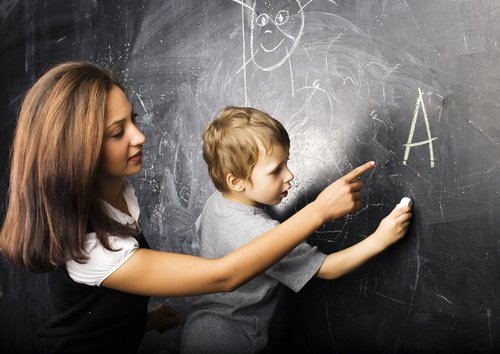The Importance of Meeting Your Child's Tutor

Some parents rely on others completely to educate their children, leaving it all in the hands of their teachers. Don’t be like these parents! You need to stay in touch with your child’s tutor from the beginning until the end of the school year.
Most of the time, when children are away from home, they’re at school. They behave differently at home and in school, so you need to participate in your child’s education too.
“High school is what kind of grows you into the person you are. I have great memories, good and bad, some learning experiences and some that I’ll take with me the rest of my life.”
– Giancarlo Stanton –
A tutor’s responsibility
Tutors are teachers who are responsible for a group of students that attend the same class. Tutors are assigned at the beginning of the school year. They help their students get good grades and develop their integral growth.
Some of the duties of a tutor include:
- Making it easier for students to participate in class.
- Following up on the personal and academic performance of their students.
- Resolving conflicts in class.
- Guiding their students professionally and academically.
- Providing answers and solutions to their students’ needs and demands.
- Coordinating their efforts with other teachers on campus.
- Offering advice, information, and support to their students’ families.
So, a tutor’s work has three recipients:
- The students.
- The teachers.
- The families.
“A good teacher can inspire hope, ignite the imagination, and instill a love of learning.”
– Brad Henry –

The importance of meeting your child’s tutor
As previously stated, tutors offer information, advice, and support to their students’ families. This is why is important that tutors meet and stay in touch with their students’ parents. This relation needs to be built on trust, respect, communication, and commitment.
In addition, families need to get involved in their child’s education and all the school matters that have an impact on their child. Therefore, they must make an effort and go to parent-teacher meetings, alone or along with other families.
Likewise, parents need to participate in other types of assignments, such as:
- Reading documents or educational leaflets.
- Filling out questionnaires or forms.
- Assist in family workshops.
- Participating in learning activities.
- Collaborating with innovational and improvement programs at school.

Tutors can also educate the families
Working with and educating the students’ families is important. This way, tutors can work more efficiently with the child, knowing that their parents will follow through at home. It’s worth mentioning that parents have a set of skills that teachers don’t, such as:
- Knowledge and experience in caring for children.
- Experiencing first hand their child’s development.
- The affective and emotional bond with their child.
For these reasons, parents better understand their child’s needs and know how to help them. In conclusion, families can also help schools, and the schools need to consider the parents and establish an open and two-way relationship.
Some parents rely on others completely to educate their children, leaving it all in the hands of their teachers. Don’t be like these parents! You need to stay in touch with your child’s tutor from the beginning until the end of the school year.
Most of the time, when children are away from home, they’re at school. They behave differently at home and in school, so you need to participate in your child’s education too.
“High school is what kind of grows you into the person you are. I have great memories, good and bad, some learning experiences and some that I’ll take with me the rest of my life.”
– Giancarlo Stanton –
A tutor’s responsibility
Tutors are teachers who are responsible for a group of students that attend the same class. Tutors are assigned at the beginning of the school year. They help their students get good grades and develop their integral growth.
Some of the duties of a tutor include:
- Making it easier for students to participate in class.
- Following up on the personal and academic performance of their students.
- Resolving conflicts in class.
- Guiding their students professionally and academically.
- Providing answers and solutions to their students’ needs and demands.
- Coordinating their efforts with other teachers on campus.
- Offering advice, information, and support to their students’ families.
So, a tutor’s work has three recipients:
- The students.
- The teachers.
- The families.
“A good teacher can inspire hope, ignite the imagination, and instill a love of learning.”
– Brad Henry –

The importance of meeting your child’s tutor
As previously stated, tutors offer information, advice, and support to their students’ families. This is why is important that tutors meet and stay in touch with their students’ parents. This relation needs to be built on trust, respect, communication, and commitment.
In addition, families need to get involved in their child’s education and all the school matters that have an impact on their child. Therefore, they must make an effort and go to parent-teacher meetings, alone or along with other families.
Likewise, parents need to participate in other types of assignments, such as:
- Reading documents or educational leaflets.
- Filling out questionnaires or forms.
- Assist in family workshops.
- Participating in learning activities.
- Collaborating with innovational and improvement programs at school.

Tutors can also educate the families
Working with and educating the students’ families is important. This way, tutors can work more efficiently with the child, knowing that their parents will follow through at home. It’s worth mentioning that parents have a set of skills that teachers don’t, such as:
- Knowledge and experience in caring for children.
- Experiencing first hand their child’s development.
- The affective and emotional bond with their child.
For these reasons, parents better understand their child’s needs and know how to help them. In conclusion, families can also help schools, and the schools need to consider the parents and establish an open and two-way relationship.
All cited sources were thoroughly reviewed by our team to ensure their quality, reliability, currency, and validity. The bibliography of this article was considered reliable and of academic or scientific accuracy.
- Booth, T. y Ainscow, M. (2015). Guía para la educación inclusiva: desarrollando el aprendizaje y la participación en los centros escolares. Madrid: OEI.
- Ortega, M. A., Sánchez, M., Fernández, P. y Redondo, A. (1991). Tutoría: qué son, qué hacen, cómo funcionan. Madrid: Popular.
- Segovia-Largo, Á. y Fresco-Calvo, X. E. (2000). La acción tutorial en el marco docente. España: Seminario Galego de Educación para la Paz.
- Simón, C, Giné, C. G. y Sarrionandia, G. E. (2016). Escuela, Familia y Comunidad: Construyendo Alianzas para Promover la Inclusión. Revista Latinoamericana de Educación Inclusiva, 10 (1), 25-42.
This text is provided for informational purposes only and does not replace consultation with a professional. If in doubt, consult your specialist.








